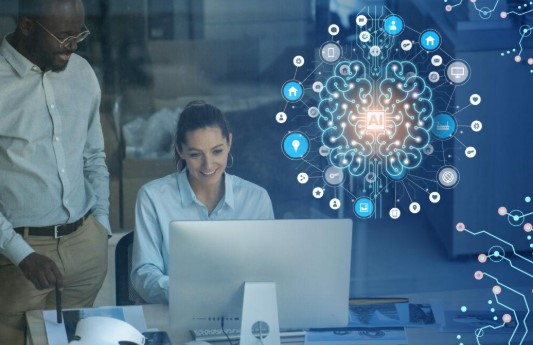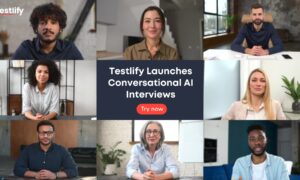In today’s highly competitive job market, fostering diversity and inclusion isn’t just a moral imperative—it’s a strategic business advantage. Companies that embrace diverse perspectives and backgrounds drive innovation, improve decision-making, and enhance employee engagement.
However, despite the growing emphasis on equitable hiring, unconscious bias continues to be a significant challenge in recruitment.
Traditional hiring processes often favor familiar backgrounds and experiences, unintentionally leading to homogenous teams that lack diverse viewpoints. This not only limits a company’s ability to innovate but also results in missed opportunities to attract top talent from a broader pool.
Enter artificial intelligence (AI) in hiring—a revolutionary AI Recruitment Software that is transforming the recruitment landscape. By leveraging machine learning algorithms and data-driven decision-making, AI helps minimize human bias, standardize evaluations, and ensure fairer hiring practices.
From blind resume screening to AI-driven interview analysis, these technologies are enabling organizations to identify and recruit talent based on skills, potential, and merit rather than subjective preferences.
As businesses strive to create more inclusive workplaces, the role of AI in hiring is becoming increasingly vital.
Let’s explore how technology is reshaping recruitment and paving the way for a more diverse and equitable workforce.
Understanding Unconscious Bias in Hiring
Unconscious bias refers to the automatic, often unintentional stereotypes that influence decision-making. For example, a hiring manager might favour a candidate who attended their alma mater or unconsciously prioritize male applicants for leadership roles. These biases can skew recruitment outcomes, perpetuating inequality in industries like tech, finance, and life sciences.
A Harvard Business Review study found that 60% of hiring decisions are made within the first 15 minutes of an interview, often based on superficial factors like appearance or accent. Left unchecked, these biases stifle diversity and limit organizational growth.
The Role of AI in Modern Recruitment
AI-driven recruitment tools are revolutionizing how companies identify talent. By automating repetitive tasks like resume screening and interview scheduling, AI allows recruiters to focus on strategic decisions. More importantly, these tools analyze data objectively, reducing reliance on gut feelings or subjective judgments.
Platforms leveraging AI can parse thousands of resumes in minutes, flagging top candidates based on skills, experience, and cultural fit. For instance, companies in highly regulated sectors like pharmaceutical recruitment are increasingly adopting such tools to ensure compliance and fairness.
How AI Minimizes Bias in Hiring
Anonymous Resume Screening
AI removes identifying details (e.g., names, gender, age) from resumes, ensuring candidates are evaluated solely on qualifications. This approach has been shown to increase diversity in candidate shortlists by 33%.
Structured Interviews
AI analyzes video interviews for keywords, tone, and content, scoring responses against predefined criteria. This eliminates inconsistencies in how different interviewers assess candidates.
Bias Detection in Job Descriptions
Tools like Textio use AI to identify gendered or exclusionary language in job postings. For example, words like “aggressive” or “ninja” can deter diverse applicants.
Predictive Analytics
By correlating historical data with employee success metrics, AI identifies traits that predict performance—not pedigree.
Real-World Examples of AI in Action
A leading life sciences company used AI to anonymize resumes and saw a 40% increase in underrepresented candidates advancing to final interviews.
Global tech firms have deployed chatbots to conduct initial candidate screenings, ensuring all applicants answer the same questions in the same format.
While these tools are transformative, their success hinges on ethical implementation. For specialized industries, partnering with experts in AI-driven recruitment solutions ensures technology aligns with sector-specific needs.
Challenges and Ethical Considerations
AI isn’t a magic bullet. If trained on biased historical data, algorithms can perpetuate inequality. For example, Amazon scrapped an AI recruiting tool in 2018 after it downgraded resumes containing the word “women’s” (e.g., “women’s chess club”).
- To mitigate risks, organizations must:
- Audit AI models for bias regularly.
- Use diverse training datasets.
- Combine AI insights with human oversight.
The MIT Sloan Management Review emphasizes that “AI should augment human judgment, not replace it.”
The Future of AI in Diversity and Inclusion
Emerging technologies like emotion AI (analyzing facial expressions) and natural language processing are refining how companies assess soft skills and cultural fit. Meanwhile, platforms that track diversity metrics over time empower organizations to measure progress transparently.
For industries like pharma and biotech, where niche expertise is critical, AI offers a way to balance speed and precision while prioritizing inclusivity. Firms adopting these tools today are better positioned to attract top talent and foster innovation.
Conclusion
AI is undeniably transforming recruitment into a fairer, more inclusive process. By automating bias-prone tasks and focusing on data-driven insights, companies can build teams that reflect the diversity of their markets. However, success requires thoughtful implementation—blending cutting-edge tools with human empathy.
As the hiring landscape evolves, forward-thinking organizations are embracing AI-powered solutions to stay competitive. Whether you’re scaling a startup or managing talent in regulated industries, the future of recruitment lies in balancing technology with humanity.



































